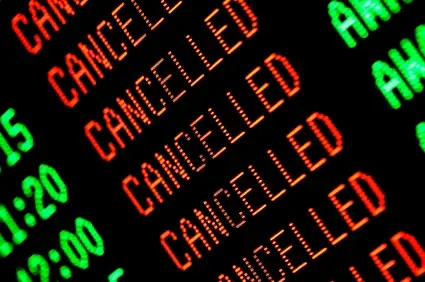
The Department of Transportation’s (DOT) tarmac delay rules are a mistake, according to a report issued yesterday by two aviation consultants. Using currently available data, the report extrapolates that the tarmac rules will result in more cancelled flights than the DOT estimated, and overall cause more harm than good. An overview of the lengthy report is here.
Let’s look at some of the key points. The study observes that cancellations jumped 40 percent in May 2010 compared to May 2009, while diversions jumped 25 percent. The study mentions but doesn’t dwell on the other obvious stat, which is that tarmac delays have been vanishing in recent months. In May, there were only five in total, four of which came on the same day. The study also attempts to prove that, contrary to the DOT’s claims, tarmac delays are unpredictable; occur in clusters, rather than in isolation; paralyze airports, making gate returns difficult; and are regional, and therefore cannot reasonably be fixed through schedule changes. Finally, the report argues that tarmac delay rules actually have a negative impact on consumer welfare.
The cumulative effect of the study is that it gives credence to all the threats and warnings lobbed from the airline industry prior to the rule taking effect: Cancellations will spike, passengers will suffer, consumer advocates will regret demanding the rule, and so forth. As such, pro-airline folks are hailing the report as proof of their prophecy, while consumer watchdogs dismiss it as bunk. The latter group’s conviction is further solidified by the authors’ jobs as aviation consultants.
The report is thick and full of stats, charts, and graphs, and on its face appears convincing and substantial. But there is one fundamental flaw with the study’s conclusions: It’s essentially operating off one month of data. That month, May 2010, certainly suggests a correlation between tarmac delay rules and increased cancellations, but in my opinion it’s too soon to say that the DOTs rules will have this or that effect on the industry. Does this mean the study’s conclusions are wrong? It’s too soon to say. But I’d rather give the airlines a few months to react and respond to the rules and work the kinks out of their contingency plans before I start judging the effectiveness of the policy.
One thing worth noting is that the study does uncover some patterns in tarmac delays that may prove useful. For example, tarmac delays spike in midsummer, as severe weather bubbles up and roars across the Midwest. Further, a significant majority of two-hour-or-longer tarmac delays occur at just eight airports/regions—predictably including Atlanta, Newark, JFK, and Washington, D.C.—suggesting that perhaps the problem can be alleviated by a scheduling fix after all. I’m sure it’s as simple as that.
We hand-pick everything we recommend and select items through testing and reviews. Some products are sent to us free of charge with no incentive to offer a favorable review. We offer our unbiased opinions and do not accept compensation to review products. All items are in stock and prices are accurate at the time of publication. If you buy something through our links, we may earn a commission.
Related
Top Fares From
Today's Top Travel Deals
Brought to you by ShermansTravel
Shop and Save with Country Inns...
Patricia Magaña
 Hotel & Lodging Deals
Hotel & Lodging Deals
$229 -- Chicago: Discounted Rates and...
Francesca Miele
 Hotel & Lodging Deals
$229+
Hotel & Lodging Deals
$229+
$188 -- Honolulu: Save on Oceanview...
Abigail Lamay
 Hotel & Lodging Deals
$188+
Hotel & Lodging Deals
$188+



